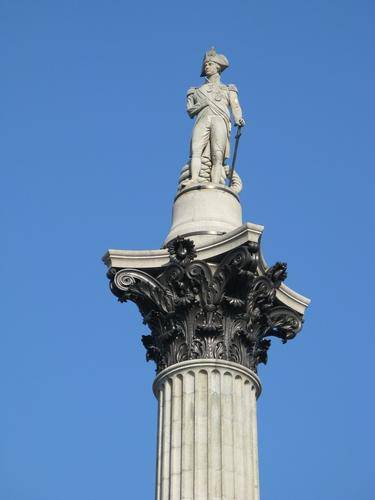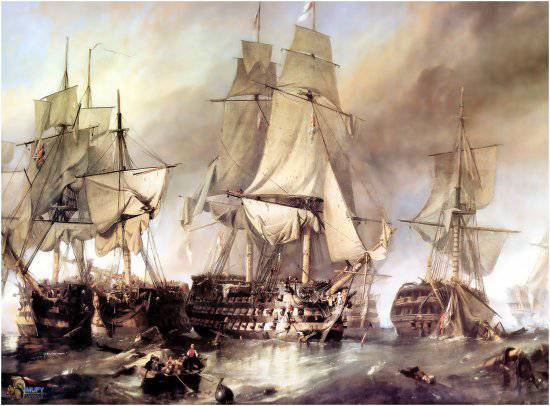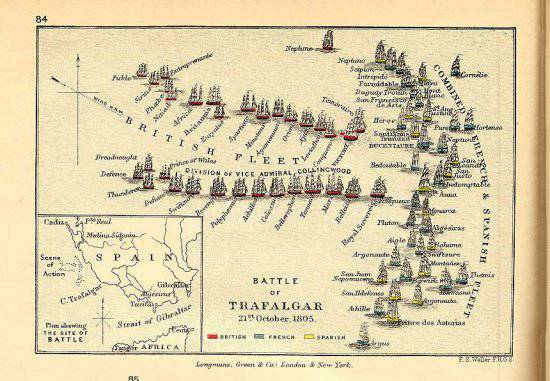Battle of trafalgar
Battle of Trafalgar, the largest naval battle of the Napoleonic wars between the English and Spanish-French fleets, which took place on October 21 1805 at Cape Trafalgar (Trafalgar), near the city of Cadiz (Spain).
Leading the 1803 war against England, Napoleon concentrated his army on the left coast of the Channel to the British Isles by the middle of 1805. The landing was planned to begin with the approach of the main forces of the French fleet. However, the combined Spanish-French squadron of Admiral P. Villeneuve could not reach the English Channel due to the opposition of the English fleet of Admiral Nelson. A warlord experienced, but inert, Villeneuve did not dare to give battle, and when meeting with the enemy, each time he retreated to the Spanish ports. In September, 1805 Nelson blocked it in Cadiz.
Forced to cancel the landing in England, Napoleon ordered his fleet to support the French troops in Italy. October 20 Villeneuve decided to go to sea after that. I learned that the emperor had already appointed a successor to him. However, having received information that Nelson was waiting for him at the Strait of Gibraltar, the French admiral turned back.
Nelson rushed in pursuit. 21 October in 5 h. 30 he discovered the Spanish-French squadron, going north. Villeneuve tried to maneuver in unfavorable winds, because of which the structure of his ships was broken.
The English fleet acted according to a plan that Nelson had brought to the captains' attention beforehand, while giving them considerable freedom to take the initiative: “If you don’t see signals in battle or do not understand them, put your ship next to the enemy — you won’t go wrong.” The Allies had a numerical advantage (the 33 of the ship against the 27), but the British sailors outnumbered the enemy with experience and training.
A squadron of Nelson in two columns at right angles from the west attacked a line of enemy ships, stretching nearly a mile. The right column (15 ships) under the command of Admiral C. Collingwood was to cut off the Spanish-French rearguard from the main forces and destroy it. The left (12 ships), which was led by Nelson himself, attacked the enemy center.
In 11 hours the first shots rang out. At 12, the signalmen of Victory, Nelson's flagship, conveyed: "England expects everyone to do their duty."
The 12 watch 30 Collingwood compartment is the Allied rearguard. His Royal Sover considerably outstripped the ships of his line and, before their approach, surrounded him, he fought with the superior forces of the enemy.
In 13, h. Nelson wedged between the center and the vanguard of the enemy squadron. The ships of the center, which appeared between two English columns, mixed up and were forced to accept a battle in which the British had a numerical advantage. Allied advance guard continued to move north. The ships entering into it were able to lie on the opposite course and move to the aid of the main forces only after 15 hours, when the outcome of the battle was already decided.
Nelson's ship aboard the French Redoubt. The French desperately resisted, leading gunfire from the masts on the Victory deck, and surrendered only after they had lost the 80% of the crew. In this battle, Nelson was mortally wounded by a musket bullet. He died in 16 hours. 30, received before his death a report on the complete victory of the English fleet. In 17 h. 30 the battle is over.
The British captured and destroyed the enemy's 18 ships. The Allies also lost about 7000 people killed, wounded and captured, the British - about 1500. The French admiral Sh. R. Magon, the commander of the rearguard, died in battle. The Spanish flagship K. Gravina died from a wound. Villeneuve was captured, took part in the solemn ceremony of the funeral of Nelson, and on his return to France, committed suicide, without waiting for the verdict of the military court.

In honor of this victory, which finally rid England of the threat of the Napoleonic invasion, a column was erected on London's Trafalgar Square in 1867, crowned with a statue of Nelson, which was cast from bronze by French guns captured at Trafalgar.
- http://mega.km.ru"rel =" nofollow ">http://mega.km.ru


Information